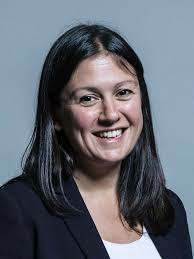Lisa Nandy – 2022 Speech on Social Housing Standards
The speech made by Lisa Nandy, the Shadow Secretary of State for Levelling Up, Housing and Communities, in the House of Commons on 16 November 2022.
I thank the Secretary of State for his statement and for advance sight of it. I join him in sending our condolences to the family of Awaab Ishak. It is the worst thing that any family could possibly imagine. It is very difficult to come to terms with the fact that, in 21st-century Britain, in one of the wealthiest countries in the world, a family could find their child dying at just two years old through completely and utterly avoidable circumstances that could, would and should have been prevented. I acknowledge that their only ask as a family is that, once and for all, the conditions for those in social housing are improved.
Today has to mark the start of a real step change in our level of urgency to improve the condition of our social housing stock and the rights of people in it. This is not just about social housing stock, however: as the housing ombudsman made absolutely clear, there are people in every form of tenure who are forced in 21st-century Britain to endure these appalling, unconscionable conditions.
The coroner said that the death of Awaab, who suffered prolonged exposure to mould,
“will and should be a defining moment for the housing sector”,
but it should also be a defining moment for us and a wake-up call to every single Member of the House who has, in whatever limited form and to whatever extent, the power and platform to make sure that this never, ever happens again. It should not take the death of a two-year-old boy in completely avoidable circumstances to get us together and act.
The truth is that although this is the most shocking outcome that anyone could imagine, this is not an unusual set of circumstances to come across the desk of any hon. Member or housing lawyer in the country. Our inboxes and constituency surgeries, in every part of the country, are overflowing with people in this position—people who have sounded the alarm over and over again, but who have simply been rendered invisible by decision makers who do not respond.
I know that the Secretary of State and I are wholly united on this issue and that he is sincere about getting a grip on it and doing something about it. Only a week ago, we stood across from each other at the Dispatch Box and talked about what we could do to strengthen the measures in the Social Housing (Regulation) Bill that is currently before Parliament to ensure that this House delivers the strongest possible legislation. If there is unity, however, there is no excuse for delay. It is time for urgency.
In that spirit, what further steps will the Secretary of State’s Department take? There is a systemic issue of housing unfit for human habitation in the social and private rented sectors. Too many families are living in overcrowded, damp, mouldy and squalid conditions, and they are disproportionately likely to be black, Asian and ethnic minority families in poverty. This has not just a heavy social cost; NHS England already spends £1.3 billion a year on treating preventable illnesses caused by cold and damp homes.
The consultation on the decent homes standard closed weeks ago, so can the Secretary of State give a timescale for that being brought into law without delay for the private and social rented sectors? We are 100% committed to decent homes standard 2, so we will work with the Government day and night to ensure that it is tough and fit for the 21st century, and that it is delivered quickly.
New regulation matters but, as the Secretary of State knows, there is a crisis for local authorities up and down the country. It would be wrong not to acknowledge that, for well-intentioned local authorities—the ones that are good landlords and are responsive to their tenants’ needs—there is still a huge, gaping hole in their finances. Will he ensure that he sits down and works through those problems with local authorities? Everybody understands that there is a major problem with the public finances, but we have to find creative ways to help local authorities now, including through longer-term funding settlements. Will he particularly ensure that any social rent cap is funded? Otherwise all we do is load more cuts on to local authorities that cannot afford them and ensure that that money is stripped out of our local housing stock at a time when, as he knows, the situation is already unconscionable.
Damp is more likely in homes that are excessively cold and expensive to heat. With energy bills going through the roof, a cold winter will lead to a spike in mould problems, as the Secretary of State will know. What is he doing to bring about the retrofitting and insulation of older social housing stock to make homes cheaper to heat? We have a housing crisis in this country, but we also have a growth crisis. There are a lot of people around the country who could use good jobs bringing those homes up to standard and literally saving lives this winter.
I welcome the fact that the Secretary of State has called in the chief executive of Rochdale Boroughwide Housing to explain himself, but will the Secretary of State commit to a wider investigation of the case and what can be learned, including the housing association’s structure and governance and whether the lack of democratic representation on its board played a part in its lack of responsiveness?
I am grateful that the Secretary of State repeatedly acknowledged during his statement that Awaab’s family have said that, in their view, it is beyond doubt that racism played a role in their treatment and the handling of their concerns. Beyond an acknowledgement, I would like to see some action to deal with that. Nobody should be subjected to personal and intrusive questions about their private lives, lifestyle and bathing habits in their own home. I was glad that the coroner recognised that Rochdale Boroughwide Housing now knows that that was completely unacceptable, but how on earth was it allowed to conclude that lifestyle and bathing habits contributed to the majority of the mould?
Further to that, an important part of the system is providing legitimate migrants and refugees with safe and secure housing. Will the Secretary of State commit to a wider review of how housing is provided and maintained for refugees in this country? I am convinced that Awaab’s family are right that the imbalance of power posed an acute problem for those who are unfamiliar with the system. I want to pay tribute to my hon. Friend the Member for Rochdale (Tony Lloyd), who is in his place, and to the Manchester Evening News. They are a powerful voice for people who do not understand the system. However, there is a problem here, and it needs to be addressed. Will the Secretary of State look at the over-representation of BAME people in poor-quality housing?
Finally—I will come to a close, Madam Deputy Speaker, because I know that there is huge interest in this across the House—we stood in this place five years ago, after the shocking events of Grenfell, and said, “Never again.” Never again has to mean something. It has to mean a legacy for the people who have lost loved ones as a consequence of the shocking imbalance of power in the housing system. Will the Secretary of State commit to working with us in the Opposition to deliver a housing system fit for the 21st century?



